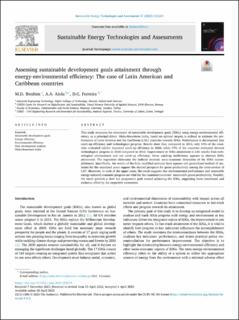Assessing sustainable development goals attainment through energy-environmental efficiency: The case of Latin American and Caribbean countries
Peer reviewed, Journal article
Published version
Permanent lenke
https://hdl.handle.net/11250/3125797Utgivelsesdato
2023Metadata
Vis full innførselSamlinger
Originalversjon
Sustainable Energy Technologies and Assessments. 2023, 57 (103219), . 10.1016/j.seta.2023.103219Sammendrag
This study evaluates the attainment of sustainable development goals (SDGs) using energy-environmental efficiency as a principal driver. Hicks-Moorsteen Index, based on optimal targets, is utilized to estimate the performance of Latin America and the Caribbean (LAC) countries towards SDGs. Performance is decomposed into catch-up efficiency and technological progress. Results show that, compared to 2012, only 15% of the countries evaluated exhibit improved catch-up efficiency in 2020, while 74% of the countries evaluated showed technological progress in 2020 compared to 2012. Improvement in SDGs attainment in LAC results from technological advancement and not catch-up efficiency. Gross catch-up inefficiency appears to obstruct SDGs attainment. The regression elaborates the indirect extrinsic socio-economic dimension of the SDGs accomplishment. Specifically, the results of the fully modified ordinary least squares and generalized method of moments for the examined years support the desired prospects for green productivity among the cross-section of LAC. Moreover, in each of the upper years, the result suggests that environmental performance and renewable energy-induced economic progress are vital for the examined countries' sustainable green productivity. Notably, the result predicts a slow but progressive path toward achieving the SDGs, suggesting more intentional and inclusive effort by the respective economies.

